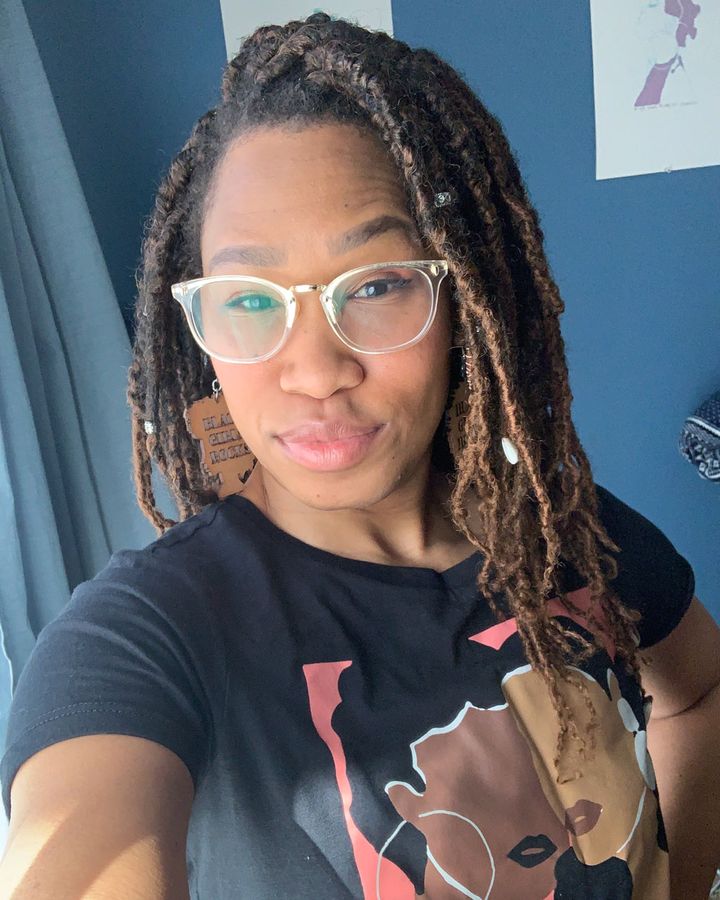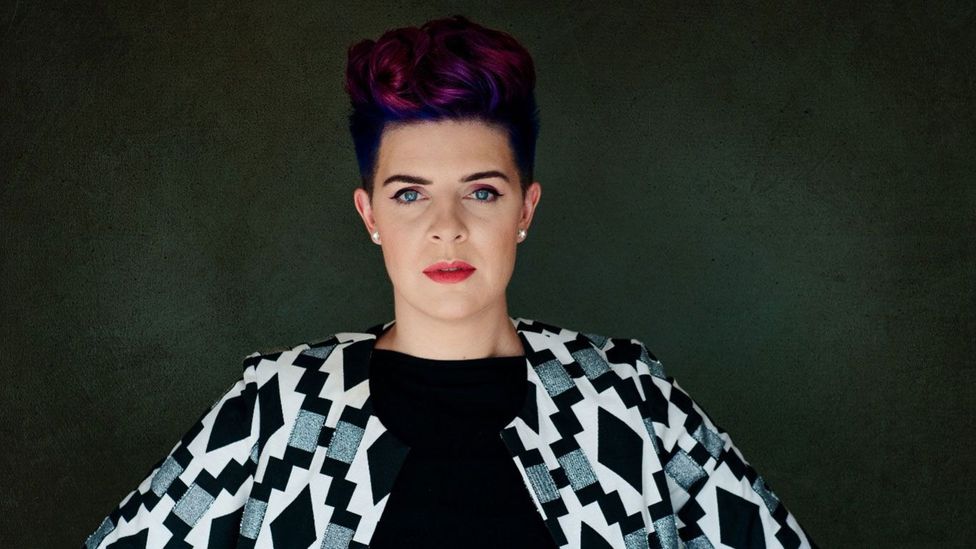When the world was sheltering in place, Takeyla Benton was coming out.
It was March 2020, and the Wisconsin, US-based financial-services professional and mother of two had just quit her job at a credit union, and broken off an engagement to a man. Lockdown gave now 39-year-old Benton time to rest and reflect on whether the identities society projected on her truly felt like her own.
“Growing up in the church, [as a] black woman, you’re forced down a path before you really even get to choose one,” she says. So, the possibility that she might not be straight, says Benton, “wasn’t anything I felt like I could explore, and still be accepted in my family and community”. Benton emerged from lockdown as an out queer woman who is still exploring what, if any labels, labels fit for her.
In popular imagination, coming out is one grand gesture: a queer person stepping out of the proverbial closet, into a celebratory spotlight of visibility. In reality, many queer people and researchers agree that coming out is more of a long-term negotiation between how we understand our identity, and how we present those identities to other people. Nearly 6% of US adults now identify as LGBTQ, more than ever recorded. Yet persistent discrimination, and the fluidity of many people's experiences of gender and sexuality, often make coming out a continuous process of navigating in what spaces, and to what degree, we can be open about our identities.
The workplace is one of the most delicate and high-stakes places queer people negotiate this relationship. Although regions and countries including the European Union, and – as of 2020 – the US prohibit employment discrimination based on gender and sexual identity, anti-LGBTQ employment bias remains rampant across the world. As of 2019, 21% of all LGBTQ Europeans reported experiencing workplace discrimination; among transgender people specifically, that rate jumped to 36%. In the US, 36% of all LGBTQ people reported workplace discrimination, and 46% reported being closeted at work. In China, meanwhile, only 5% of LGBTQ employees reported being completely open about their identities at work.
Reasons vary for why people stay silent about their sexual and gender identities, but workplace stigma and potential repercussions are among them. Sexist, racist and anti-LGBTQ microaggressions were a constant presence in Benton’s previous jobs. “I was struggling to find a place in this white, male industry, where women and people of colour are shut out. There was no way I would have come out working in that former life.”

Takeyla Benton says she wouldn't have ever felt comfortable coming out in her prior work environments (Credit: Takeyla Benton)
Most LGBTQ people navigate a similarly delicate path around disclosure. For those who can “pass” as heterosexual or cisgender, coming out can often mean choosing between paying a psychological price for the relative safety of invisibility, and paying a potential social and economic price for being open about one's identity. For others, especially those who are gender nonconforming, being closeted at work isn’t an option. This can have significant detrimental effects: people who are perceived as falling outside of conventional gender norms are at higher risk of career-disrupting workplace harassment and discrimination.
At the same time, coming out at work can have huge benefits. LGBTQ people who are more open about their identities experience have increased physical and emotional wellbeing. And, for trans people, gender affirmation can be lifesaving. In the workplace, research has found that increased authenticity around sexual orientation reduces psychological stress. Yet these benefits hinge on having a supportive professional environment, as being perceived as queer can also increase workers’ risk of experiencing bias.
“All of those elements come together for an intersection of risk,” says Josh Miller, co-founder of Empathy Paradigm, a Dallas, Texas-based LGBTQ mental-health consultancy that offers coming out and allyship coaching. “There are so many good consequences to coming out, but are you prepared for the bad ones?”
The gender identity and sexual orientation gap
Despite the massive strides in global LGBTQ visibility throughout the past few decades, there is still relatively little research on sexual-orientation and gender-identity discrimination at work. What we do know, however, indicates that queer workers pay a heavy price for defying gender and sexual norms.
Discrimination begins at the job application itself. In the US, employers are more likely to view resumes from visibly gay or lesbian applicants unfavourably. In the European Union, 11% of LGBTQ job applicants reported experiencing discrimination in their job search.
Those candidates who are hired then must contend with workplace harassment, isolation and colleagues’ ignorance, all of which heighten rates of anxiety and depression. Systemic discrimination can lead to “brain drains” of LGBTQ people from particular fields; researchers estimate that current STEM industries have lost up to 120,000 viable candidates due to the cumulative effects of anti-LGBTQ bias.
That was the experience of Harris Eddie Hill, a UK-based pansexual, demisexual and non-binary podcaster and public speaking coach. At one of Hill’s former workplaces, they felt there “was not room for anybody different – it was very much a boys’ club”. Hill’s colleagues didn’t use their correct pronouns, and the company didn’t have an LGBTQ equality policy, under which Hill could appeal for support.
Hill’s experience is common. Across the world, trans and non-binary people are especially subject to increased workplace discrimination, based on the enforcement of binary gender norms. Many jobs, especially in service industries, penalise or reward workers based on their gender presentations – for example, in the case of servers who are pressured to perform femininity for tips.
In some contexts, gender norms are part of the job description. According to Yiu-Tung Suen, founding director of the sexualities research programme at the Chinese University of Hong Kong, “If you look at advertisements in mainland China, they sometimes very blatantly list either gender expression or the expectations of how they’re supposed to perform.” This penalises gender non-conforming people, who experience high rates of discrimination across the Asia Pacific region.
And, across the world, transgender people are subjected to workplace harassment and violence. In the United States, 90% of transgender people reported either experiencing workplace discrimination, or hiding their identity to avoid it. In the EU, six times as many trans people as cis lesbian, gay and bisexual people report being assaulted at work. This has been exacerbated by a recent increase in anti-transgender laws, in countries including the US and Hungary.
Additionally, the constant pressure on transgender and non-binary people to explain their gender identity to others can rapidly lead to exhaustion. Hill opted to leave their job and pursue self-employment, partly as a way to free themselves from assaults to the validity of their identity. “I don’t want to sit here and be at the receiving end of people’s opinions,” says Hill.

Harris Eddie Hill, who identifies as non-binary, says past workplaces didn't respect their pronouns, and Hill didn't have a way to appeal for support (Credit: Angela Geldenhuys)
Many people at the intersections of multiple systems of oppression – particularly people of colour in majority-white contexts – also experience constant identity policing. “My race is politicised, who I sleep with is politicised and if it doesn’t fit into that box that white supremacy is comfortable with, then you’ve got to question your whole self,” says Benton.
Navigating the ‘career’ of outness
In the face of all these pressures, coming out in one’s professional life isn’t just a one-time event. Instead, many researchers frame it as a ‘career’ in itself, which LGBTQ people constantly navigate alongside their paid work.
When Elizabeth Gonzalez Morales, a California-based queer woman therapist with particular expertise in supporting Latinx adults, is working with clients considering coming out, she first helps them identify their needs and values. “What is the idea of their authentic selves? What does that look like?” she asks.
Similarly, Miller advises his clients to assess their needs as well as the positives and potential risks of coming out at work – from getting to live more authentically or discovering queer community, to potentially getting fired or simply feeling exhausted. Then, Miller advises them to ask themselves: “Is being authentic for you more important than some of these consequences?”
Sometimes, these risks outweigh the benefits – and, for many, that’s OK. For workers who decide it’s important to be out, however, Hill advises making a safety plan. First, they say, learn your company’s and locale’s stance toward LGBTQ rights. “Find out if they have a policy. If they don’t, what are the rules? What are the laws?”
Miller suggests asking about LGBTQ-affirming policies when interviewing for a job. Benton, meanwhile, says there’s strength in networks: she’s found a workplace that’s supportive of her identity, and also built solidarity by connecting with another queer woman in her field. She now facilitates an LGBTQ Employee Resource Group.
Coming out – for the first or hundredth time – is hard, and queer workers deserve to be gentle with themselves. “It’s OK to take small steps,” says Benton. That could mean being out to some people but not others, or pausing to assess your safety and choosing to come out at a later time.
Miller, who was raised in a religious family, and struggled to come to terms with his gay and gender-fluid identity, first came out at work while bartending. He experienced homophobic violence. “I was denied tips a few times. I had one person spit on me,” he says. “It was enough to keep me in the closet.”
The 2016 Pulse Nightclub shooting in the US, in which he lost a friend, and the subsequent outpouring of solidarity, motivated Miller to try coming out again. In the wake of loss, “I was determined to be me.” This time, Miller created the LGBTQ-affirming workplace he wanted, by co-founding his own diversity, equity and inclusion consultancy, and networking with other queer professionals.
Creating inclusion
Coming out can be an affirming experience. Yet the labour of creating of a more LGBTQ-inclusive workplace shouldn’t become an unpaid second job for queer workers. “The second it falls onto you to be a spokesperson and work there at the same time, it’s unacceptable,” says Hill.
The most important determinant of workplace inclusivity is national policy and culture. But there are also actions employers can take to create a more affirming environment for LGBTQ workers now.
“It starts with the small things: policies that are more in alignment with all families, not just specifically straight, traditional family structures,” says Benton. “Work hours. Structures for how the employees are allowed to have time off. All of those things were harmful to me as a single mom, were harmful to me as a black woman, were harmful to me as a queer person,” she says.

Upon coming out at work, Josh Miller says he experienced repercussions and even violence, which kept him closeted in many situations (Credit: Jo at Be Present Studios)
Policies like flexible work hours and paid leave can support all those whose families fall out of heterosexual, able-bodied, nuclear-family modes – for example, those caring for extended family and chosen family, people with disabilities or those parenting solo. This is especially helpful for queer people who experience multiple kinds of marginalisation.
Ultimately, the greatest predictor of LGBTQ employees’ wellbeing is the creation of supportive workplaces, through employer policies against discrimination and for fair wages; straight and cisgender allyship; and the advocacy of LGBTQ people themselves. Inclusive work environments help queer employees thrive – and create more open and innovative workplaces in which, says Hungarian Academy of Sciences sociology Professor Judit Takács, “you enable people to free their potential”.
Companies often claim they don’t need LGBTQ-specific policies, since they don’t have ‘observably’ LGBTQ employees, according to Takács’s research. In fact, she says, it’s likely that these employees simply don’t feel comfortable coming out. “They are there – they just wouldn’t show their real face to you, because you don’t deserve it.” Employers can take a proactive, rather than reactive, approach by creating an inclusion plan, which includes specific gender and sexuality policies and protections for employees.
Cisgender and heterosexual employees can also create a more affirming environment for their LGBTQ colleagues through conscious allyship. “We always also advocate the allies to actively come out as LGBT+ friendly,” says Chinese University of Hong Kong’s Suen, through actions such as sharing their own pronouns or displaying a rainbow flag.
The best thing an ally can do in the workplace, adds Benton, is to interrogate their own biases, and support LGBTQ colleagues from a place of compassion, rather than self-interest. “You’ve got to face your own stuff first, and then you can be more supportive of other people in a way that's not profit-based,” says Benton. That’s a constant learning process. “Get it wrong, fix it, do it better next time.”
Coming out at work can be risky, but it also carries with it the possibility of a huge reward: queer community. For most of the advocates BBC Worklife talked to for this piece, outness at work has been fraught – but it’s also been central to their success.
Gonzalez Morales, the therapist, says that being more visibly out in the workplace opened up a new aspect of her practice, and enabled her to help other queer people. “I decided I’m going to state it and be vocal about being queer, because ultimately, that’s part of my work,” she says. For Miller, meanwhile, coming out at work helped him turn a history of trauma into a successful career as a consultant and advocate. As difficult as coming out was, and as many tries as it took, it was necessary. “Since that time, I haven’t looked back.”
"work" - Google News
May 26, 2021 at 02:00PM
https://ift.tt/3uJx0iA
The risks of coming out at work - BBC News
"work" - Google News
https://ift.tt/3bUEaYA
Bagikan Berita Ini














0 Response to "The risks of coming out at work - BBC News"
Post a Comment